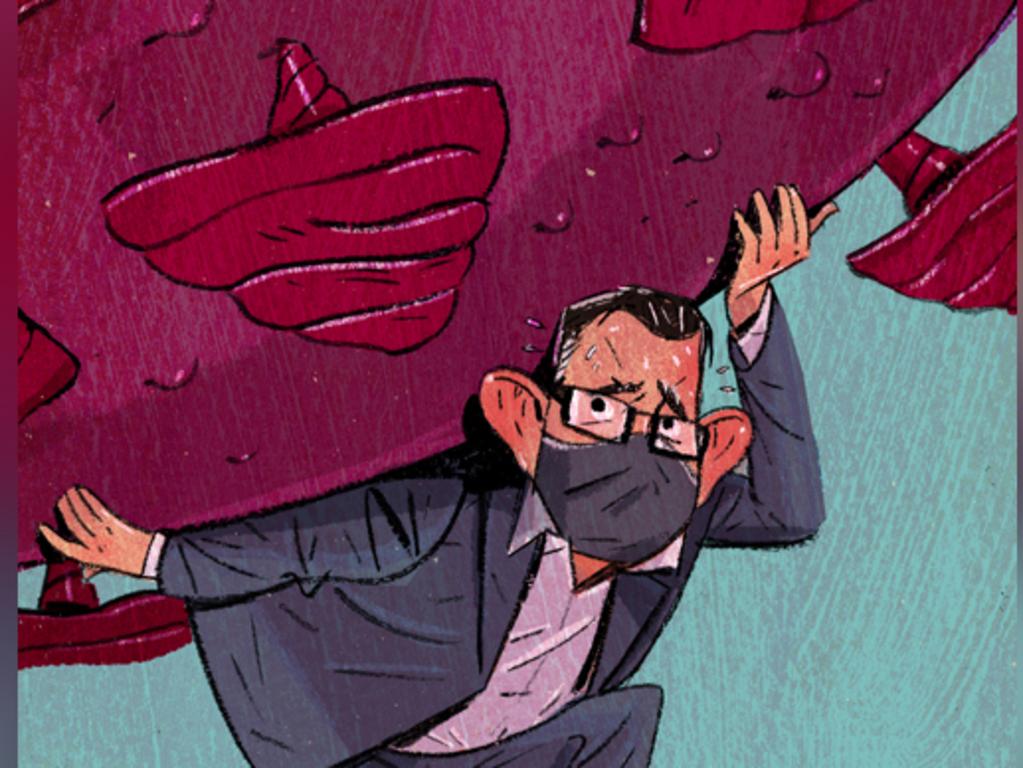History repeats with good governance in retreat
Evidence indicates that Daniel Andrews runs Victoria much in the same way that he dominates the Labor Party’s Socialist Left faction.

The depression of the early 1890s, the Great Depression of the 1930s, the recession of the early 90s and today’s pandemic come readily to mind.
The impact of these four events was made distinctly worse by incompetent governance in, respectively, Victoria, NSW, Victoria and Victoria again.
Growing up in Melbourne in the aftermath of World War II, I was aware of the long-term impact of the 1890s depression. It was as if public building had halted in Melbourne around the turn of the century. Certainly Victoria was adversely affected by World War I and the depression of the 1930s. But the impact of the 1890s event still lingered.
All of the colonies were harmed by the economic downturn. But none so much as Victoria because of the collapse of the banking system, which followed the bust of the land boom, in a welter of pork-barrelling and corruption. The story is told in Michael Cannon’s 1966 book The Land Boomers.
In her entry in The Oxford Companion to Australian History, Jenny Lee reported that unemployment in Victoria peaked at 28 per cent in 1893. Without question the various administrations that governed the colony of Victoria in the late 19th century were responsible for presiding over an economy that was particularly vulnerable to the international economic downturn.
It was much the same with the Great Depression of the late 1920s and early 30s. Again an international economic downturn hit hard at an isolated nation that traded on world markets. But the impact was made worse because of the indebtedness of the various state governments.
Attempts by the commonwealth to rein in public expenditure had begun with the creation of the Loan Council in 1923, which was formalised in 1929 and took full effect in May 1931 in the Premiers’ Plan designed to stabilise public finances. The Scullin Labor government lost office in December 1931 and was replaced by Joseph Lyons’s United Australia Party government in early 1932.
Lyons set about presiding over Australia’s economic recovery from the Great Depression. However, like Scullin before him, Lyons was stymied by the populist Labor government of NSW led by Jack Lang. In May 1932 Lang was dismissed by NSW governor Sir Philip Game for breaking the federal government’s Financial Agreements Enforcement Act.
But not before Lang’s irresponsible government plan, including the threat not to pay overseas bond holders, had made the impact of the Great Depression on NSW — and by necessity the rest of Australia — more deleterious than otherwise would have been the case.
Then there was Australia’s last economic downturn, before the current one. In the early 90s, Australia was adversely affected by international events. But, once again, the national economy was dragged down further by Victoria.
For an enactment of the penny-wise-pound-foolish in real time, no one need to look further than John Cain’s Labor government in Victoria in the late 80s and early 90s. Cain was a scrupulously honest premier. So much so that it is said that he would tally the cost of his personal phone calls and pay the amount to Victoria’s consolidated revenue.
Meanwhile, when it came to governance of others, Cain was asleep at the wheel. State expenditure got out of control and the State Bank of Victoria, and in particular its merchant bank subsidiary Tricontinental, lent as if there was no tomorrow. There was. And both banks effectively collapsed. All of Australia was affected by the international downturn at that time. But Australia’s recession was deepened by Victoria’s performance. The state was propped up when (then) treasurer Paul Keating effectively arranged for the State Bank of Victoria to be taken over by the Commonwealth Bank (then owned by the federal government).
Then there’s COVID-19. Australia recovered well from the Spanish flu pandemic of 1919-20. But a century ago Australian governments did not close down large sections of the private sector economy as has occurred this time, most notably in Victoria.
In a sense, Victorian Labor Premier Daniel Andrews is the authoritarian Lang of his time, except that he is most unlikely to be dismissed by the state governor. All of Australia is suffering from the national impact of a pandemic. But the disastrous handling by the Andrews government of COVID-19 has brought much more pain and suffering than would have been the case if Victoria was governed like, say, NSW.
Lang accepted his dismissal in 1932 — his biographer Bede Nairn reported that some of his supporters believed that he wanted to be sacked. Cain stepped down in August 1990, not long after the State Bank of Victoria debacle.
But indications are that Andrews believes that if he can justify one more shutdown at one more marathon media conference all will be well in the end.
Andrews is an unusual premier in that he has set up an inquiry into who initiated the decision that led to the unintended consequence whereby the virus escaped from quarantine hotels resulting in a second wave of infections and many deaths. Also he seems unaware who initiated the draconian decision to introduce an 8pm to 5am curfew, which cannot be justified in medical terms.
The evidence indicates that Andrews runs Victoria much in the same way that he dominates the Labor Party’s Socialist Left faction in his state. It’s a one-gear-only operation whereby everyone is expected to get on board and back the driver as he ploughs through business, employees, the non-COVID-19 focused health system and more besides to achieve a goal of effective COVID-19 eradication, which many medical experts believe to be unattainable.
The way it’s going, Victoria will be responsible for the intensity of three out of the past four depressions or recessions.
Delusional Lang barrackers used to chant “Lang is greater than Lenin”. Right now, it seems that Andrews is no greater than Lang.
Gerard Henderson is executive director of the Sydney Institute. His Media Watch Dog blog can be found at www.theaustralian.com.au







As a continent that interacts with the rest of the world, Australia cannot escape depressions, recessions or pandemics. However, colonial (before 1901), state and federal governments can make such disasters worse than should be the case.